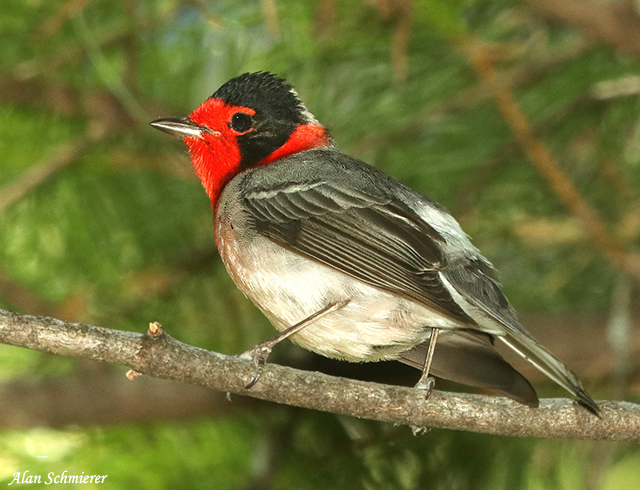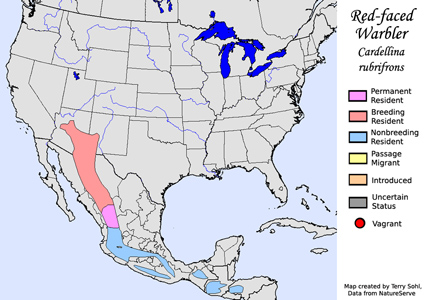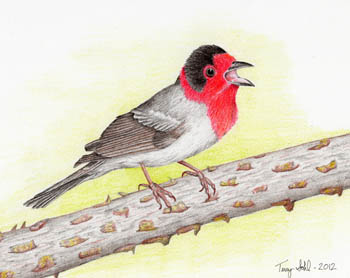| Length: 5.5 inches | Wingspan: 8.5 inches | Seasonality: Non-resident in South Dakota |
| ID Keys: Red and black head pattern, gray upperparts, light underparts | ||
 The
Red-faced Warbler is a bird of mountain forests of Mexico and of the
southwestern U.S. Their range in the U.S. is in the mountain forests
of Arizona and New Mexico. They are one of the only warblers that have
a bright red color, with the Painted Redstart being the other. Males
are slightly more colorful than females, but unlike most warblers, females
share a very similar plumage to the males. Females have slightly less
colorful heads.
The
Red-faced Warbler is a bird of mountain forests of Mexico and of the
southwestern U.S. Their range in the U.S. is in the mountain forests
of Arizona and New Mexico. They are one of the only warblers that have
a bright red color, with the Painted Redstart being the other. Males
are slightly more colorful than females, but unlike most warblers, females
share a very similar plumage to the males. Females have slightly less
colorful heads.
Habitat: CRed-faced Warblers in the U.S. portion of their range are mostly found in evergreen forests interspersed with patches of deciduous trees, typically at relatively high elevation. Habitat in winter months is also typically high-elevation forest, be it evergreen, mixed, or deciduous forest.
Diet: Feeds primarily on insects, with caterpillars one of its preferred food items.
Behavior: Despite the bright colors, Red-faced Warblers can be difficult to observe at times due to their preference for foraging in thick vegetation..
Nesting: Red-faced Warblers build a small nest on the ground, typically in a small depression under a tree root or plant. They build a small cup-shaped nest of dead leaves and bark, lined with plant fibers and down. .
Song: Song of the Red-faced Warbler male is often sung during pauses while the male forages rather high in the canopy, and consists of a series of high mellow notes.
Migration: Migratory, with most birds moving south to southern Mexico and Central America for the winter. Some birds in the southern part of the summer breeding range in Mexico may be permanent residents.
Interactive eBird Map: Click here to access an interactive eBird map of Red-faced Warbler sightings
Similar Species: Distinctive in U.S. range.
Conservation Status: As noted by Audubon.org (link below), Red-faced Warblers are listed as a priority bird species for the Mexican Highlands by Partners in Flight. However the IUCN red list shows them as a species of "least concern", and the species may actually be expanding its range northward in the United States. They are potentially sensitive to the effects of logging of forested habitat.
Further Information: 1) Cornell's All About Birds - Red-faced Warbler
2) WhatBird - Red-faced Warbler
3) Audubon.org - Red-faced Warbler
Image Information: Public Domain photo taken by Alan Schmierer.
Additional Images: Look below for additional, higher-resolution images of the Red-faced Warbler.
| Click below for a higher-resolution map |
 |
| South Dakota Status: Non-resident in South Dakota |
Additional Red-faced Warbler Images

